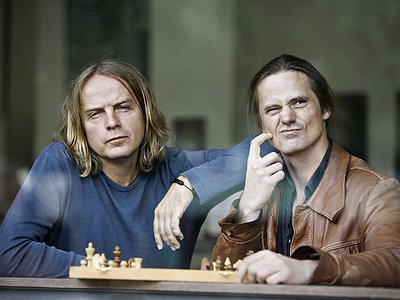Name: Mo'Horizons
Members: Ralf Droesemeyer, Mark Wetzler
Interviewee: Ralf Droesemeyer
Nationality: German
Occupation: Producer, composer
Current release: Mo'Horizons' new full-length album Mango is out via Agogo.
If this Mo'Horizons interview piqued your interest, visit the project on Facebook.
Do you think that some of your earliest musical experiences planted a seed for your interest in production and technology?
YES! As my earliest musical experiences 45 years ago were recording mixtapes, this seed of spreading what I'm producing has been there quite early.
What were your very first active steps with music technology and how would you rate the gains made through experience - can one train/learn being an artist/producer?
My way has been quite straight as you can see in my "career":
- Mixtapes
- DJing
- Studio Internship
- School of Audio Engeneering Berlin
- Building Own Studio
- Producing bands and singers
- Producing my own music, remixing and still DJing
So from my own experiences I do believe in the authenticity of artists / music producers, but I can imagine that it's also possible to live this successfully based on training and learning.
Were/are you interested in the history of production and recording? If so, which events, albums, artists, or insights stand out for you?
I've been aware about this only under the aspect of records diggin and DJing and I'm mostly impressed by the variety in the work of Quincy Jones.
Making music, in the beginning, is often playful and about discovery. How do you retain a sense of playfulness as things become more professionalised and how do you still draw surprises from equipment you may be very familiar with?
Writing and producing new songs is big fun for me especially in the beginning when everything is fresh and new.
This early phase of playfulness is making up for later phases of automatisms and routine.
For your own creativity, what is the balance and relative importance between what you learned from teachers, tutorials and other producers on the one hand – and what you discovered, understood, and achieved yourself? What are examples for both of these?
It's the old story of theory and practice.
The theory forms your basis, but the practice with your own experiences is what makes the difference. The latter is absolutely more important for your own creativity.
How and for what reasons has your music set-up evolved over the years and what are currently some of the most important pieces of gear and software for you?
I'm a believer in working set-ups and my team of Cubase, Ableton-Live and my good old Wurlitzer E-Piano has been my base for centuries!
Have there been technologies which have profoundly influenced, changed or questioned the way you make music?
Yes! Sampling! From starting with my first Akai S1000 until nowadays using websites like Loopmasters.
Late producer SOPHIE said: “You have the possibility with electronic music to generate any texture, and any sound. So why would any musician want to limit themselves?” What's your take on that and the relevance of limitations in your set-up and process?
Having no limitations can lead to confusion.
In my opinion it's more important to be the chief and master of your own set-up to get your work really done, to finish your songs, than having the drawer full of unfinished excursions into the infinite world of possibilities.
From the earliest sketches to the finished piece, what does your current production workflow/process look like?
My secret.
Rhythm, sound design, melody/harmony, something else – when do the different elements of a piece come into play for you?
Rhythm and harmony first, melodies later, sound design at the end.
In relation to sound, one often reads words like “material”, “sculpting”, and “design”. How does your own way of working with sound look like? Do you find using presets lazy?
Actually I wish I would give more attention to the SOUND, comparing the way my finished songs sound with other often better sounding songs.
BUT as I'm putting the focus on the SONGS and I'm doing everything by myself, usually at the end there's not enough time to get more detailed into that.
So I do use presets not because I'm lazy but because I'm under time pressure.
What, to you, are the respective benefits of solo work and collaborations and do you often feel lonely in the studio? Can machines act as collaborators to you?
In my opinion this depends on your musical network.
With solo work you can probably realize mostly your own ideas. But if you have the chance to integrate other creative people into your work, this interaction can lead to bigger results.
To some, the advent of AI and 'intelligent' composing tools offers potential for machines to contribute to the creative process. What are your hopes, fears, expectations and possible concrete plans in this regard?
Until now nothing. But I'm a bit curious about it ...
If you could make a wish for the future directly to a product developer at a Hard- or Software company – what are developments in tools/instruments you would like to see and hear?
Hard- and software have allowed me to produce my own music even though I don't consid myself a musician, but a DJ.
I'm not asking for anything, just being thankful for what's possible.




